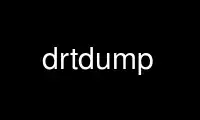
This is the command drtdump that can be run in the OnWorks free hosting provider using one of our multiple free online workstations such as Ubuntu Online, Fedora Online, Windows online emulator or MAC OS online emulator
PROGRAM:
NAME
drtdump - Dump DICOM RT file and data set
SYNOPSIS
drtdump [options] drtfile-in...
DESCRIPTION
The drtdump utility dumps the contents of a DICOM Radiation Therapy (RT) object (file
format or raw data set) to stdout in textual form. The output consists of essential
information on the RT object in a format that is probably easier to read than the more
generic one from dcmdump.
If drtdump reads a raw data set (DICOM data without a file format meta-header) it will
attempt to guess the transfer syntax by examining the first few bytes of the file. It is
not always possible to correctly guess the transfer syntax and it is better to convert a
data set to a file format whenever possible (using the dcmconv utility). It is also
possible to use the -f and -t[ieb] options to force drtdump to read a dataset with a
particular transfer syntax.
PARAMETERS
drtfile-in DICOM RT input filename to be dumped
OPTIONS
general options
-h --help
print this help text and exit
--version
print version information and exit
--arguments
print expanded command line arguments
-q --quiet
quiet mode, print no warnings and errors
-v --verbose
verbose mode, print processing details
-d --debug
debug mode, print debug information
-ll --log-level [l]evel: string constant
(fatal, error, warn, info, debug, trace)
use level l for the logger
-lc --log-config [f]ilename: string
use config file f for the logger
input options
input file format:
+f --read-file
read file format or data set (default)
+fo --read-file-only
read file format only
-f --read-dataset
read data set without file meta information
input transfer syntax:
-t= --read-xfer-auto
use TS recognition (default)
-td --read-xfer-detect
ignore TS specified in the file meta header
-te --read-xfer-little
read with explicit VR little endian TS
-tb --read-xfer-big
read with explicit VR big endian TS
-ti --read-xfer-implicit
read with implicit VR little endian TS
output options
printing:
+Pf --print-filename
print header with filename for each input file
NOTES
DICOM Conformance
The drtdump utility supports the following SOP Classes:
RTImageStorage 1.2.840.10008.5.1.4.1.1.481.1
RTDoseStorage 1.2.840.10008.5.1.4.1.1.481.2
RTStructureSetStorage 1.2.840.10008.5.1.4.1.1.481.3
RTPlanStorage 1.2.840.10008.5.1.4.1.1.481.5
RTTreatmentSummaryRecordStorage 1.2.840.10008.5.1.4.1.1.481.7
RTIonPlanStorage 1.2.840.10008.5.1.4.1.1.481.8
RTIonBeamsTreatmentRecordStorage 1.2.840.10008.5.1.4.1.1.481.9
LOGGING
The level of logging output of the various command line tools and underlying libraries can
be specified by the user. By default, only errors and warnings are written to the standard
error stream. Using option --verbose also informational messages like processing details
are reported. Option --debug can be used to get more details on the internal activity,
e.g. for debugging purposes. Other logging levels can be selected using option --log-
level. In --quiet mode only fatal errors are reported. In such very severe error events,
the application will usually terminate. For more details on the different logging levels,
see documentation of module 'oflog'.
In case the logging output should be written to file (optionally with logfile rotation),
to syslog (Unix) or the event log (Windows) option --log-config can be used. This
configuration file also allows for directing only certain messages to a particular output
stream and for filtering certain messages based on the module or application where they
are generated. An example configuration file is provided in <etcdir>/logger.cfg.
COMMAND LINE
All command line tools use the following notation for parameters: square brackets enclose
optional values (0-1), three trailing dots indicate that multiple values are allowed
(1-n), a combination of both means 0 to n values.
Command line options are distinguished from parameters by a leading '+' or '-' sign,
respectively. Usually, order and position of command line options are arbitrary (i.e. they
can appear anywhere). However, if options are mutually exclusive the rightmost appearance
is used. This behavior conforms to the standard evaluation rules of common Unix shells.
In addition, one or more command files can be specified using an '@' sign as a prefix to
the filename (e.g. @command.txt). Such a command argument is replaced by the content of
the corresponding text file (multiple whitespaces are treated as a single separator unless
they appear between two quotation marks) prior to any further evaluation. Please note that
a command file cannot contain another command file. This simple but effective approach
allows one to summarize common combinations of options/parameters and avoids longish and
confusing command lines (an example is provided in file <datadir>/dumppat.txt).
ENVIRONMENT
The drtdump utility will attempt to load DICOM data dictionaries specified in the
DCMDICTPATH environment variable. By default, i.e. if the DCMDICTPATH environment variable
is not set, the file <datadir>/dicom.dic will be loaded unless the dictionary is built
into the application (default for Windows).
The default behavior should be preferred and the DCMDICTPATH environment variable only
used when alternative data dictionaries are required. The DCMDICTPATH environment variable
has the same format as the Unix shell PATH variable in that a colon (':') separates
entries. On Windows systems, a semicolon (';') is used as a separator. The data dictionary
code will attempt to load each file specified in the DCMDICTPATH environment variable. It
is an error if no data dictionary can be loaded.
Use drtdump online using onworks.net services
